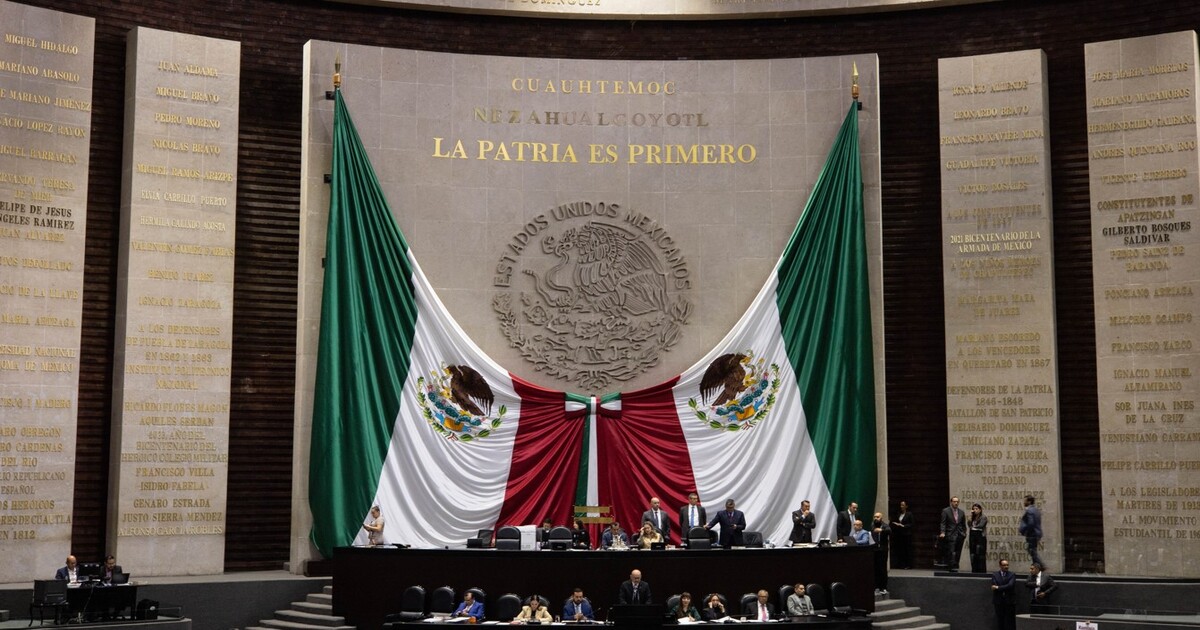Mexico’s Challenges Beyond Trump: The Unfinished Democratic Transition
Mexico’s political shifts have failed to dismantle entrenched clientelism, corruption and power centralization, sustaining an illusion of democratic transformation while insecurity and violence persist.
April 15, 2025

A Strategic Intervention Paper (SIP) from the Global Ideas Center
You may quote from this text, provided you mention the name of the author and reference it as a new Strategic Intervention Paper (SIP) published by the Global Ideas Center in Berlin on The Globalist.
For over seven decades, Mexico’s political system was dominated by the Institutional Revolutionary Party (PRI), a regime that crafted a deeply centralized system of power built on patronage, clientelism and institutional control.
The PRI’s extensive networks ensured electoral dominance through a combination of co-option, favor exchanges and financial inducements. This long period of single-party rule not only suppressed political competition, but also entrenched corruption and administrative inertia, leaving behind a political culture resistant to genuine democratic change.
Even as electoral reforms were introduced in the 1990s, these practices remained embedded within the system, shaping how power was exercised across all levels of government.
The PRI’s enduring legacy
The legacy of the PRI continues to influence Mexican governance today. For decades, the party perfected the art of neutralizing opposition — not through democratic debate, but through strategic rewards and punishments.
The rise of new political actors has done little to dismantle these practices, as many of the PRI’s defining characteristics — nepotism, corruption and political clientelism — persist under different banners.
This historical context is essential in understanding why Mexico’s transition to democracy has remained largely superficial — with political alternation failing to translate into institutional reform.
The illusory democratic transition
The 2000 presidential election, which ended the PRI’s 71-year rule, was heralded as a watershed moment in Mexican history.
The victory of the National Action Party (PAN), and its candidate, Vicente Fox, was seen as the dawn of a new era — one that would break with the corrupt, authoritarian past and usher in a truly democratic system.
The expectation was that this transition would not only guarantee electoral competition, but also strengthen institutions, reinforce the rule of law and end the entrenched practices that had plagued Mexican politics for decades. However, reality fell far short of these aspirations.
While the PAN’s rise to power ended single-party rule, it did not dismantle the deeply rooted structures that had allowed the PRI to govern unchallenged for so long.
Congressional gridlock
Fox’s presidency was marred by congressional gridlock, a lack of institutional reforms and an inability to curb corruption. His successor, Felipe Calderón (PAN), intensified the militarized war on drugs, which only exacerbated violence and weakened state legitimacy.
By 2012, public disillusionment with the PAN’s failure to deliver on its promises allowed the PRI to reclaim power under Enrique Peña Nieto, whose administration was engulfed in corruption scandals and human rights violations.
The alternating rule between PAN and PRI did little to strengthen democracy or security, creating fertile ground for the rise of a populist alternative.
Enter AMLO and the National Regeneration Movement
By 2018, widespread frustration with the political establishment led to the landslide victory of Andrés Manuel López Obrador (AMLO) and his party, National Regeneration Movement (MORENA).
AMLO presented himself as a break from the corrupt elites, promising an agenda of social justice, anti-corruption measures and economic reform. His triumph was fueled by deep resentment towards both PAN and PRI, which had failed to address inequality, insecurity and systemic corruption.
Yet, as his presidency progressed, it became evident that MORENA was not the transformative force many had hoped for. Instead, it gradually adopted the same old practices of power centralization and patronage, raising concerns that Mexico’s democratic transition remained incomplete.
Founded in 2014, MORENA positioned itself as a party of the people, committed to breaking with the political status quo. It promised transparency, accountability and a more inclusive governance model.
More of the same
However, as the party consolidated power, it became increasingly clear that MORENA was replicating many of the PRI’s traditional methods of governance. Rather than dismantling the corrupt networks of the past, it absorbed them into its own structure, rewarding loyalty over competence and prioritizing political control over institutional reform.
Like the PRI before it, MORENA has relied on direct cash transfers and welfare programs to cultivate electoral support, creating a vast network of political dependency.
Additionally, MORENA has faced allegations of nepotism, misuse of public funds and efforts to weaken democratic checks and balances. These patterns suggest that rather than representing a true departure from Mexico’s political past, MORENA has merely rebranded the same clientelist system under a different name.
The erosion of democracy and its impact on security
Mexico’s lack of a fully functioning democracy has had severe consequences for security. While the country holds regular elections, this alone does not guarantee democratic governance.
Strong institutions, an independent judiciary and a professional security apparatus are essential components of a stable democracy — yet Mexico has struggled to develop these mechanisms.
The persistence of political clientelism, corruption, and weak law enforcement has created an environment where organized crime thrives with impunity.
A vicious cycle
The failure of successive governments to build effective institutions has allowed criminal organizations to infiltrate politics, often colluding with corrupt officials and security forces. This has resulted in a vicious cycle where weak governance exacerbates insecurity, and insecurity in turn justifies further erosion of democratic norms.
Governments have frequently responded to rising violence with militarization rather than institutional reform, ignoring the root causes of crime — poverty, inequality and corruption — while empowering the armed forces in ways that weaken civilian oversight.
Without a functioning democratic system that prioritizes human security and institutional integrity, Mexico will remain trapped in a perpetual crisis of violence and authoritarian drift.
The Teuchitlán incident: A warning sign
The recent events in Teuchitlán, Jalisco, serve as a stark reminder of these systemic failures. In early 2024, reports emerged of armed criminal groups operating freely in the area, engaging in violent confrontations, extortion and intimidation of local residents.
The situation escalated when several police officers and civilians were attacked, exposing the lack of state control and the failure of security forces to respond effectively. The discovery at a ranch in Teuchitlán, Jalisco, on March 5, 2025, has exposed the brutal reality of cartel violence and the ongoing crisis of disappearances in Mexico.
Search groups investigating the site uncovered 1,308 personal belongings — including clothing, shoes and blankets, alongside cremated remains and mass graves.
Survivors have testified that the Jalisco New Generation Cartel (CJNG) used the location for forced recruitment, torture and murder. The revelation has intensified calls for justice and better forensic investigations — prompting President Claudia Sheinbaum to introduce reforms aimed at improving identification records and search efforts.
The tip of the iceberg
However, with over 124,000 people still missing, and thousands of clandestine graves scattered across the country, Teuchitlán serves as a grim reminder of the scale of violence and impunity in Mexico.
The escalation of violence in the region highlights the extent to which political institutions have failed to provide security, allowing criminal networks to flourish unchecked.
The incident reflects a broader pattern across Mexico, where the state’s inability to enforce the rule of law has emboldened criminal groups and eroded public trust in government.
A symptom of a much deeper issue
This crisis is not merely a local problem but a symptom of a much deeper issue. When political elites prioritize power retention over governance, security becomes an afterthought.
The inability to break with entrenched practices — whether through meaningful police reform, judicial independence or anti-corruption measures — ensures that these incidents will continue to occur.
Teuchitlán is not an anomaly. It is a consequence of decades of democratic decay and institutional neglect.
Sheinbaum and austerity: Budget cuts and the future of democracy
Claudia Sheinbaum was elected as Mexico’s first female president in the 2024 general election, representing the ruling MORENA party. A close ally of outgoing AMLO, she secured victory with strong support from his political base, benefiting from his popularity and social welfare policies.
Sheinbaum is expected to continue AMLO’s legacy, maintaining his Fourth Transformation (4T) agenda, which focuses on social programs, state-led economic policies and austerity measures.
While she has pledged continuity, she may also face challenges in addressing security concerns, judicial reforms and economic stability — all while balancing her own leadership style with AMLO’s enduring influence.
Unlikely to deliver
Sheinbaum’s presidency is unlikely to bring the radical transformation Mexico needs. Rather than presenting bold policies to address insecurity and corruption, during her tenure as Head of Government of Mexico City, she mirrored AMLO’s approach — minimizing security concerns, downplaying violence statistics and relying on militarization rather than institutional reform.
She has not proposed a comprehensive strategy to strengthen the justice system, professionalize law enforcement or tackle corruption.
Compounding this challenge are the austerity policies implemented by AMLO, which have significantly weakened the state’s capacity to govern effectively. Budget cuts aimed at reducing government spending have resulted in underfunded security forces, weakened judicial institutions and a diminished capacity to combat organized crime.
These policies have not curbed corruption but have instead made it easier for existing patronage networks to operate without scrutiny. Without the necessary investment in public institutions, Mexico’s democratic foundations will continue to erode.
Conclusion
Mexico’s transition to democracy remains incomplete, hindered by a persistent legacy of corruption, clientelism and institutional weakness. The fall of the PRI in 2000 failed to produce the systemic change many had hoped for, and MORENA’s rise has only reinforced existing patterns of governance under a different name.
The state’s failure to ensure security and uphold the rule of law is symptomatic of broader democratic deficiencies, leaving citizens vulnerable and disillusioned.
Ultimately, the blame should not fall on the victims of Mexico’s insecurity but on the government that has systematically failed its people. Electoral democracy exists in Mexico, but in practice, the state has neglected its most fundamental responsibilities.
Decades of political mismanagement, institutional decay and prioritization of power over governance have left millions exposed to violence, corruption and impunity.
Unless decisive action is taken to reform institutions, strengthen the rule of law and invest in security and justice, Mexico’s democratic aspirations will remain an unfulfilled promise.
True democracy is not just about holding elections — it is about ensuring justice, security and dignity for all. Right now, Mexico is failing its people.
Takeaways
Mexico’s political shifts have failed to dismantle entrenched clientelism, corruption and power centralization, sustaining an illusion of democratic transformation while insecurity and violence persist.
The legacy of the PRI continues to influence Mexican governance today. For decades, the party perfected the art of neutralizing opposition — not through democratic debate, but through strategic rewards and punishments.
The victory of the National Action Party (PAN), and its candidate, Vicente Fox, was seen as the dawn of a new era — one that would break with the corrupt, authoritarian past and usher in a truly democratic system. However, reality fell far short of these aspirations.
Mexico’s lack of a fully functioning democracy has had severe consequences for security. While the country holds regular elections, this alone does not guarantee democratic governance.
Mexican governments have frequently responded to rising violence with militarization rather than institutional reform, ignoring the root causes of crime — poverty, inequality and corruption — while empowering the armed forces in ways that weaken civilian oversight.
Without a functioning democratic system that prioritizes human security and institutional integrity, Mexico will remain trapped in a perpetual crisis of violence and authoritarian drift.
The blame should not fall on the victims of Mexico’s insecurity but on the government that has systematically failed its people. Electoral democracy exists in Mexico, but in practice the state has neglected its most fundamental responsibilities.
Unless decisive action is taken to reform institutions, strengthen the rule of law and invest in security and justice, Mexico’s democratic aspirations will remain an unfulfilled promise.
A Strategic Intervention Paper (SIP) from the Global Ideas Center
You may quote from this text, provided you mention the name of the author and reference it as a new Strategic Intervention Paper (SIP) published by the Global Ideas Center in Berlin on The Globalist.


